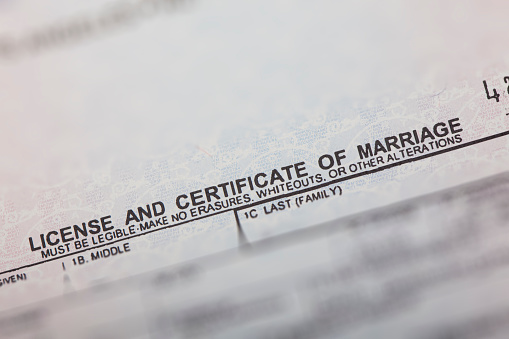California Marriage - General Information

You do not need to be a California resident to marry in California.
To marry in California, the two parties may not be already married to each other or other individuals.
Marriage by proxy is NOT allowed in California. Family Code, Section 420(a), requires the two parties, marriage officiant and witness if applicable be physically present together in the same location for the marriage to be performed.
California Family Code 420(b) allows a member of the Armed Forces of the United States who is stationed overseas and serving in a conflict or a war and is unable to appear for licensure and solemnization of the marriage to enter into a marriage by the appearance of an attorney-in-fact, commissioned and empowered in writing for that purpose through a power of attorney (POA). Applicants must use the POA form issued by the State Registrar’s Office that can be obtained at the following link: POA form (PDF).
- The attorney-in-fact must personally appear at the County Clerk’s Office with the party who is not stationed overseas and POA that is acknowledged by a notary or witnessed by two officers of the United States Armed Forces. Copies of the form, including by facsimile, are not acceptable.
- The POA shall state the full given names at birth, or by court order, of the parties to be married, and that the POA is solely for the purpose of authorizing the attorney-in-fact to obtain a marriage license on the person’s behalf and participate in the solemnization of the marriage.
- The original POA shall be a part of the marriage certificate upon registration. Additional information can be obtained from the County Clerk or State Registrar’s Office.
Blood tests are NOT required to obtain a marriage license in California.
Both parties must appear in person and bring valid picture identification to the County Clerk’s Office to apply for a marriage license in California. Valid picture identification is one that contains a photograph, date of birth, and an issue and expiration date, such as a state-issued identification card, drivers license, passport, military identification, etc. Some counties may also require a copy of your birth certificate.
- If you have been married before, you will need to know the specific date your last marriage ended, and how it ended (Death, Dissolution, Divorce or Nullity). Some counties may require a copy of the final judgment if your previous marriage ended by dissolution or nullity.
- Marriage licenses are valid for 90 days from the date of issuance. If you do not get married within 90 days, the license will no longer be valid. You must purchase a new license.
- Many County Clerks in California perform civil marriage ceremonies in their offices. For further information regarding civil marriage ceremonies, please contact the County Clerk’s Office directly to see if they provide this service.
California Family Code, Section 400, states the persons authorized to solemnize marriage ceremonies in California are as follows:
- A priest, minister, or rabbi of any religious denomination.
- A judge or retired judge, commissioner of civil marriages or retired commissioner of civil marriages, commissioner or retired commissioner, or assistant commissioner of a court of record in this state.
- A judge or magistrate who has resigned from office.
- Any of the following judges or magistrates of the United States.
- A justice or retired justice of the United States Supreme Court.
- A judge or retired judge of a court of appeals, a district court, or a court created by an act of Congress the judges of which are entitled to hold office during good behavior.
- A judge or retired judge of a bankruptcy court or a tax court.
- A United States magistrate or retired magistrate.
- A legislator or constitutional officer of this state or a member of Congress who represents a district within this state, while that person holds office.
California Family Code 400.1 allows marriage to be solemnized by a County Supervisor, City Clerk, or Mayor of a city elected in accordance with Article 3 (commencing with Section 34900) of Chapter 4 of Part 1 of Division 2 of Title 4 of the Government Code, while that person holds office. The County Supervisor, City Clerk, or Mayor shall obtain and review from the County Clerk all available instructions for marriage solemnization before the County Supervisor, City Clerk, or Mayor first solemnizes a marriage.
California Family Code, Section 401, allows Deputy Commissioners to perform marriages and may do so in any California county. The Commissioner of Civil Marriages may appoint Deputy Commissioners of Civil Marriages who may solemnize marriages under the direction of the Commissioner of Civil Marriages and shall perform other duties directed by the Commissioner. For each county, the County Clerk is designated as a Commissioner of Civil Marriages.
The fees and hours of issuance for a marriage license may vary by county.
The person solemnizing the marriage must return the original marriage license to the County Clerk or County Recorder as applicable within 10 days of the date of the ceremony. Addresses should be on the county site.
You will NOT receive a copy of your marriage license after you have been married unless you request and pay for a certified copy from the County Clerk or County Recorder as applicable.
ALL information on the marriage license MUST be legible, unambiguous and reproducible. DO NOT change any information on the license, cross out information, use white-out, etc., as that will require the payment for and issuance of a duplicate marriage license. Contact the County Clerk’s Office if you have questions about completing the marriage license and/or incorrect information contained on the marriage license.